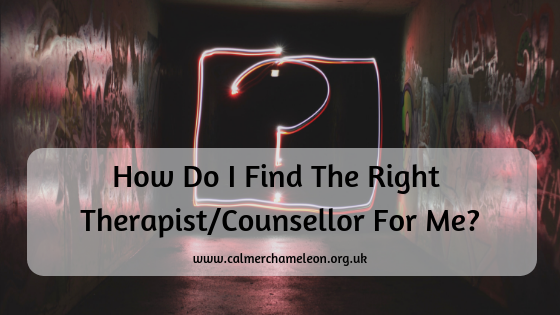Finding a Therapist

When you need psychotherapy or counselling, you are usually at a point where you are feeling vulnerable. You may not be in a frame of mind where you are making clear decisions as conditions such as depression and anxiety can make your thoughts foggy. It is therefore even more important to have some pointers of what to look for and what kind of decisions you can make before you start looking. Here are some questions to consider:
- Do you have a preference for the gender of your therapist? If so this will make your search more focused from the start.
- How much can you afford to pay for sessions? Decide on an upper limit and that will be a factor in your decision on who to contact.
- How far are you able to travel to sessions and what form of transport do you use? If you use public transport this may play a part in your decision making as you will need somewhere accessible by bus, tram, train etc. If you are a car driver, how far do you want to travel? It can be worth travelling further if you find a therapist who meets all your other criteria so be flexible about this if you can.
- Do you know anyone who has had a good experience of therapy? If so, ask them who they went to and what their contact details are. Personal recommendation is a good place to start but remember that we are all different so this therapist still may not suit you.
- Is the therapist fully qualified and accredited? At the moment in Britain there is no formal way of licensing therapists as there is for doctors and nurses. What we have instead are various professional bodies who have accreditation processes to ensure a good level of training and competence. I would advise that you look for someone who is accredited by a professional body as this shows a willingness to have their practice regularly reviewed. It also means that they have committed to having regular supervision, ongoing professional development training and are covered by the appropriate insurance to practice. Professional bodies have lists of therapist who are accredited which you can search for someone local to you. Here are some examples:-
BACP list of accredited therapists
BABCP list of accredited therapists
UK Council for Psychotherapists (UKCP)
The British Psychologist Society list of therapists
- If any therapist you contact seems reluctant to talk about their experience or training, don’t make an appointment with them.
- Does the therapist have experience in working with the issues that you want to focus on? If you are not sure, you can check this out when you talk to them. Many therapists list areas of interest and expertise on their adverts or websites.
Once you have got a short list of people to contact either by looking on the professional body lists or by googling therapists who are local to your area, you are ready to ring up and talk to them. This is where the most important aspect of choosing comes in… your gut feeling. In order to work effectively with a therapist, they have to be someone that you can trust and feel comfortable to share very personal details about yourself. Last time I saw a private therapist I just knew when I spoke to her on the phone that I could get on with her. I had phoned her up to talk about a book I was reviewing for a professional journal as it was her about her specialism and as we spoke I realised that there were some things that I wanted to work on and she was the person I could do that with. It turned out to be the right decision for me and I really do think that our initial responses to people are worth listening to.
A therapist isn’t a bitter medicine that you have to endure, you need to feel heard and respected by the person you choose. If you don’t get that impression when you speak to them on the phone, choose someone else. Once you find someone who you feel you can work with, book an initial appointment with them.
When you meet at the initial appointment it gives you another opportunity to see whether you feel that you can open up to the therapist. There should be no commitment to further sessions at this point. The first session is a chance for you both to decide if you can work together. The BACP has a useful factsheet to help at this point.
A good therapist invites regular feedback from clients and will ask you what your experience of the session has been and whether you want to book some more sessions. If you feel confident that you can open up with them, go ahead and arrange another appointment.
